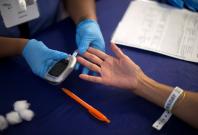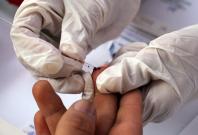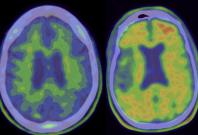 Every cell in the body responds to the hormone insulin, and if that process starts to fail, you get diabetes.
Every cell in the body responds to the hormone insulin, and if that process starts to fail, you get diabetes.
 The innovations are built upon the first version of SHERLOCK, developed in 2017, and adds to a growing field of research that harnesses CRISPR systems for uses beyond gene editing.
The innovations are built upon the first version of SHERLOCK, developed in 2017, and adds to a growing field of research that harnesses CRISPR systems for uses beyond gene editing.
 The algorithm could distinguish the retinal images of a smoker from that of a non-smoker 71 per cent of the time, the study found.
The algorithm could distinguish the retinal images of a smoker from that of a non-smoker 71 per cent of the time, the study found.
 Though calcium helps to build and protect your bones, excess levels of it in brain cells may lead to Parkinson's disease.
Though calcium helps to build and protect your bones, excess levels of it in brain cells may lead to Parkinson's disease.
 In a major breakthrough, scientists in Google have discovered an advanced way to assess a person's risk of cardiovascular events with machine learning
In a major breakthrough, scientists in Google have discovered an advanced way to assess a person's risk of cardiovascular events with machine learning
 The experts, especially health specialists, could contribute to the major steps the kingdom has been taking to implement various reforms.
The experts, especially health specialists, could contribute to the major steps the kingdom has been taking to implement various reforms.
 The new finding paves way for genetically tailoring the organs to be compatible with the immune system of the patient receiving them, thus removing the possibility of rejection.
The new finding paves way for genetically tailoring the organs to be compatible with the immune system of the patient receiving them, thus removing the possibility of rejection.
 The new blood and urine tests searches for damage to proteins and could lead to earlier detection of autism and advance treatment.
The new blood and urine tests searches for damage to proteins and could lead to earlier detection of autism and advance treatment.
 The study found that all the individuals studied, aged 12 to 25, who had a left-brain perinatal stroke, used the right side of their brains for language.
The study found that all the individuals studied, aged 12 to 25, who had a left-brain perinatal stroke, used the right side of their brains for language.
 The Health Promotion Board in Singapore is aiming to implement various plans to reduce the amount of sugar in food products.
The Health Promotion Board in Singapore is aiming to implement various plans to reduce the amount of sugar in food products.
 A new study report published in the PLoS Genetics journal has revealed that a gene mutation that can be passed from fathers to daughters could increase the risks of ovarian cancer.
A new study report published in the PLoS Genetics journal has revealed that a gene mutation that can be passed from fathers to daughters could increase the risks of ovarian cancer.
 The treatment called AB126 was developed using extracellular vesicles (EV), which are fluid-filled structures known as exosomes.
The treatment called AB126 was developed using extracellular vesicles (EV), which are fluid-filled structures known as exosomes.
 A new study has hinted that a particular brain protein thought to cause Alzheimer's disease could be passed to patients through contaminated surgical tools
A new study has hinted that a particular brain protein thought to cause Alzheimer's disease could be passed to patients through contaminated surgical tools
 In a major breakthrough, researchers at the Stanford University have successfully grown sheep embryos containing human cells
In a major breakthrough, researchers at the Stanford University have successfully grown sheep embryos containing human cells
 A study published in the Journal of Clinical Investigation has revealed that a common drug used to treat hypertension is capable of preventing the onset of type 1 diabetes
A study published in the Journal of Clinical Investigation has revealed that a common drug used to treat hypertension is capable of preventing the onset of type 1 diabetes
















